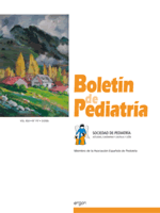Variabilidad del manejo hospitalario de la bronquiolitis por virus respiratorio sincitial en menores de 6 meses en los últimos diez años
M. Fernández Díaz , E.M. Fernández , C. Menéndez Arias , C. Molinos Norniella , G. Viejo de la Guerra , G. Solís Sánchez
Bol. Pediatr. 2006; 46 (197): 210 - 216
Objetivo: conocer variabilidad de tratamiento en bronquiolitis aguda por Virus Respiratorio Sincitial (BA-VRS) en un hospital no universitario, valorando los cambios producidos en los últimos 10 años Material y métodos: estudio descriptivo retrospectivo. Historias clínicas de niños ingresados por BA-VRS, menores de 6 meses de edad, en nuestro hospital desde 1996 hasta 2006. Comparación de dos quinquenios (96-01 y 01-06). Resultados: en el período de estudio se atendieron 161.398 urgencias pediátricas ingresando 7.662 niños menores de 6 meses de los que 810 fueron bronquiolitis agudas, y de ellos 264 VRS positivos. Edad media fue 3,1 meses, IC (95% 2,6-3,7). El 46,2 % tenía tratamiento previo (33% broncodilatadores, 17,4 % corticoides y 6,1% antibióticos). Al ingreso se realizó radiografía tórax en 86,4% y analítica en 61%. Tratamientos administrados durante el ingreso: salbutamol nebulizado (81,4%), corticoides (44,7%), antibióticos (21,2 %), adrenalina nebulizada (15,2 %) y bromuro de ipratropio nebulizado (6,1 %). Medidas de soporte: oxigenoterapia (68,2 %), lavados nasales (84,5%), humedad ambiental (53%) y fisioterapia (31,4%). El 26,9% precisó vía intravenosa y diez niños (4,25%) asistencia en cuidados intensivos. Estancia media global: 6 días (IC 95% 5,6-6,3) Comparación por quinquenios (96-01 y 01-06): diferencias significativas en uso de corticoides (55,2 y 27,3%), adrenalina (0 y 40,4%) y salbutamol (94,2 y 57,3%). Estancia media y evolución no presentan diferencias estadísticamente significativas. Conclusiones: aunque en los últimos años ha disminuido el uso de corticoides y de salbutamol, el tratamiento farmacológico de la bronquiolitis por VRS sigue utilizándose en un alto porcentaje de niños sin que su utilidad haya sido demostrada.
Variability of the hospital management of respiratory syncytial virus bronchiolitis in children under six months of age in the last ten years
Objective: to know the treatment variability in acute bronchiolitis by respiratory syncytial virus (AB-RSV) in a not university hospital, analyzing the last ten year?s changes. Design and setting: descriptive and retrospective study. AB-RSV´s clinical cases of infants less than 6 months of age, from 1996 to 2006 .We compare both five-year periods (96-01 and 01-06). Results: in the study period 161398 paediatric urgencies were attended, and 7.662 infants less than 6 moths were admitted. From them, 810 were acute bonchiolitis, and 264 of this were VSR positive. Median age was 3.1 months (CI 95% 2.6-3.7). 46.2% of patients were taken treatment (33% bronchodilators, 17.4% corticoids and 6.1% antibiotics). After admission, the diagnostic testing were chest-x-ray film (86.4%) and blood test (61%). During the hospitalized period treatments: nebulized salbutamol (81.4%), corticoids (44.7%), nebulized epinefrine (15.2%) and nebulized anticolinergics (6.1%). Supportive therapies: oxygen (68.2%), nasal wash (84.5%), humidity (53%) and chest physiotherapy (31.4%). The 26.9% needed fluid therapy and 10 infants (4.2%) were discharged to intensive care unit. Median length of stay: six days (CI 95% 6.6-6.3). Quinquennial comparison (96-01 and 01-06): we found statistics differences in the utilization of corticoids (55.2 to 27.3%), epinefine (0 to 40.4%) and salbutamol (94.2 to 57.3%). There were not significant statistics differences at the median length of stay and the development. Conclusions: in spite of the last 5 years decreasing corticoids and salbutamol use, RSV acute bronchiolitis pharmacological treatments continues using in high percentage, although their usefulness have not been not proven yet.
Artículo completo (PDF) (156 kb.)
- Neumología
Buscar en el boletín
Año 2006, Volumen 46, Número 197

Boletín completo en PDF (1591 kb.)
En esta edición...
- Editorial (1 artículos)
- Revisiones (2 artículos)
- Originales (2 artículos)
- Pediatría e Internet (1 artículos)
- Artículo especial (2 artículos)
- Acceso libre a la información científica (1 artículos)
- Recuerdo histórico (1 artículos)
- In memoriam (1 artículos)
- Noticiario (1 artículos)
- Fe de erratas (1 artículos)